This post originally appeared on April 1, 2015. The book that resulted from this Autism Acceptance Month project, The ABCs of Autism Acceptance, is available from Autonomous Press.
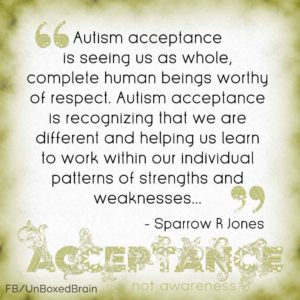
[image description: A quote card, white with olive green highlights. It says “Autism acceptance is seeing us as whole, complete human beings worthy of respect. Autism acceptance is recognizing that we are different and helping us learn to work within our individual patterns of strengths and weaknesses…” – Sparrow R. Jones. Beneath the quote is the word ACCEPTANCE in all capital letters, an ornate font, and olive green. The bottom left corner of the image says FB/UnBoxedBrain, indicating the facebook page of the creator of the quote card.]
A is for Acceptance
You may have noticed in the last half-decade or so that there is a growing trend toward speaking of autism acceptance instead of autism awareness. By now, most of you probably know why people are making that choice, but just yesterday I saw a lot of people arguing about the topic, so I think we still need to make it clear.
Autism awareness, in and of itself, is not inherently bad. By now, most people are aware that there is a thing called autism but, in my experience, most people are not very aware of what that autism thing actually is. So I do, at least partially, agree with the people who say we still need more awareness.
What I have a problem with is the form that awareness tends to take.
A week ago, I had to stop listening to the radio because all the stations were already gearing up for April with lots of “awareness” and lots of advertisements about awareness events. I heard a lot about children with autism and nothing at all about Autistic adults. Not only do we “age out” of most services when we turn 18, but we also become invisible. It’s as if the entire world stops caring about us once we are no longer cute children to worry about and, instead, inconvenient adults to be stuck with.
I heard a lot of scare talk, including hearing us repeatedly compared to diabetes, cancer and AIDS. Diabetes, cancer and AIDS kill children. Autism does not. Diabetes, cancer and AIDS are illnesses laid on top of a child’s underlying identity – they can change a child’s philosophy but they do not change innate aspects of their identity. Autism is a cognitive and perceptual difference that is so deeply rooted in our neurology that it cannot be separated from our identity. Beneath cancer, there is a healthy child hoping to break free. Beneath autism, there is more autism – it’s autism all the way to the core. Autistic children do not “go into remission,” they develop coping skills and they mature into Autistic adults, and they work to learn ways to communicate with those around them. There might be suffering that can be alleviated – seizures brought under control, gastrointestinal disorders treated, methods learned and sometimes medications taken for mitigating anxiety. Autistic adults often do not resemble the Autistic children they once were – we grow and develop all our lives – but Autistic adults are still every bit as Autistic as they were when they were children, no matter how many coping skills are learned, no matter how “indistinguishable from their peers” they become.
At the center of the autism awareness movement is an organization known as Autism Speaks that functions like a giant magnet, drawing all donations to them. In the ten years that Autism Speaks has been around, local organizations have watched their funding dry up. Autism Speaks dominates the autism charity scene now and, as a result, they have the power to set the tone when it comes to “awareness.” And that tone is one of despair and misery. We are portrayed as burdens who break up marriages and destroy the lives of those around us. We have been compared to “lepers” (an outdated term for people with Hansen’s disease) and our parents to saints for taking care of us. The awareness that is being put forth is shaped around a rhetoric of fear. Autism Speaks is one of the few organizations that is widely hated by the population it was established to serve. Only one Autistic person was ever accepted in a leadership role and he resigned, saying, “No one says the Cancer Society does not speak for them. No one describes the Cystic Fibrosis Foundation as an evil organization. All that and more is said of Autism Speaks every day. I’ve tried to be a voice of moderation but it hasn’t worked. Too many of the views expressed by the organization are not my own; indeed I hold very different points of view.”
So that is autism awareness. That is what we are rejecting.
What is autism acceptance? Autism acceptance is seeing us as whole, complete human beings worthy of respect. Autism acceptance is recognizing that we are different and helping us learn to work within our individual patterns of strengths and weaknesses to become the best people we can be, not trying to transform us into someone we are not. Autism acceptance is remembering always that Autistic people are listening, including those who might appear not to be, and choosing to speak of autism and Autistic people in ways that presume competence and communicate value.
“Tolerance says, “Well, I have to put up with you.” Awareness says, “I know you have a problem and are working earnestly to fix it.” Acceptance says, “You are amazing because you are you, and not despite your differences, but because of them.”” – Kassiane Sibley
“Acceptance is about recognizing that an autistic person is, and will always be, different but not less – even as some challenges are addressed. ” – Amy Sequenzia
“Autistic people are not viewed as able beings, this view makes us suffer.” – Emma Zurcher-Long
“Autism Acceptance means supporting the Autistic person in learning the things they want to learn and in gaining the skills they need for what they want to do. Autism Acceptance is the radical assertion that at the level of broad, overarching principles, what Autistic people need isn’t that different. We need to be accepted for who we are. We need to hear that we’re OK, we need to hear that the things we have trouble with don’t make us broken or lazy or horrible people. We need people’s actions towards us to reflect that. We need people to listen when we say we need help, and we need people to listen when we say we don’t. We need to be taken as the whole people that we are, and we need to be met with the understanding that we are the experts in our own lives and abilities.” – Alyssa
“Good teaching is based in deep respect for the individual, the cognitive learning style of each student, the shared excitement about the topic of study. Best practice in teaching autistic students isn’t any different, though these faculty would be insulted if I told them so.” – Carolyn Ogburn
“Over the past two years, I have asked Tyler many times how he feels about having autism. And while he clearly understands how the autism negatively affects his social skills and attention, he always tells me that he likes his autism. Although he has also told me, at times, that he wants to be “normal,” he continues to insist that his autism helps him. So if he likes his autism, do I really have the right to counsel him otherwise?” – Kymberly Grosso
“If you have the autism acceptance song in your heart, add Paula and Estée’s voices to your blog rolls, Subscribe to their blogs. Tweet, ‘like’, and show your respect and support to these powerful women. Don’t allow their names to fade into internet oblivion as others try to opt into autism acceptance because it is now the fashion. They were doing it before it was cool. It is easier to say accept autism now because others paid the high cost for daring to say it before us.” – Kerima Çevik
“Acceptance means accepting yourself as you are, even in the face of persistent attempts throughout your life to get you to be what you are not. Especially in the face of persistent attempts throughout your life to get you to be what you are not. The best you can be is Autistic. Let me explain. “The best you can be is Autistic” means that you are at your best when you are being fully who you are, able to express yourself and move through the world in ways that are right for you, comfortable for your body. “The best you can be is Autistic” does not imply impairments, “less than,” “can only do so much.” On the contrary, it means that you are who you are- your pervasive Autistic self (which actually includes those parts that observers might think are “typical” just because they can’t see anything that looks unusual to them), and that encompasses all of who you are, not just the parts that have been “permitted,” and not just the stuff that whatever the DSM of the moment says are your deficits.
“You have the right, or should, to grow in ways that are good for you, that you think are good for you. You have the right to make changes in your life that you think are the correct ones for you.” – Paula C. Durbin-Westby, founder of Autism Acceptance Day/Month/Year/Decade
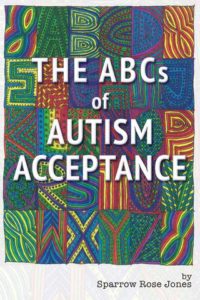

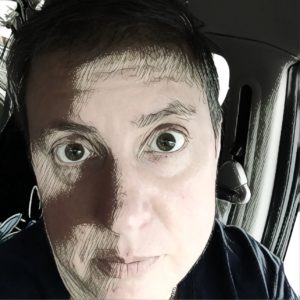
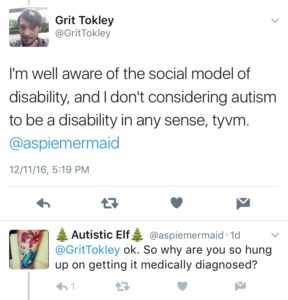
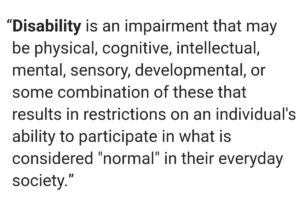

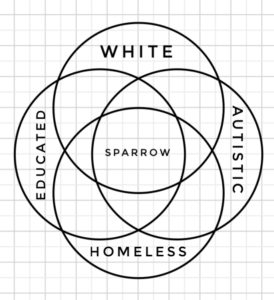

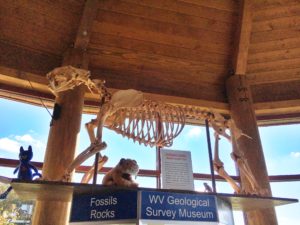


Recent Comments